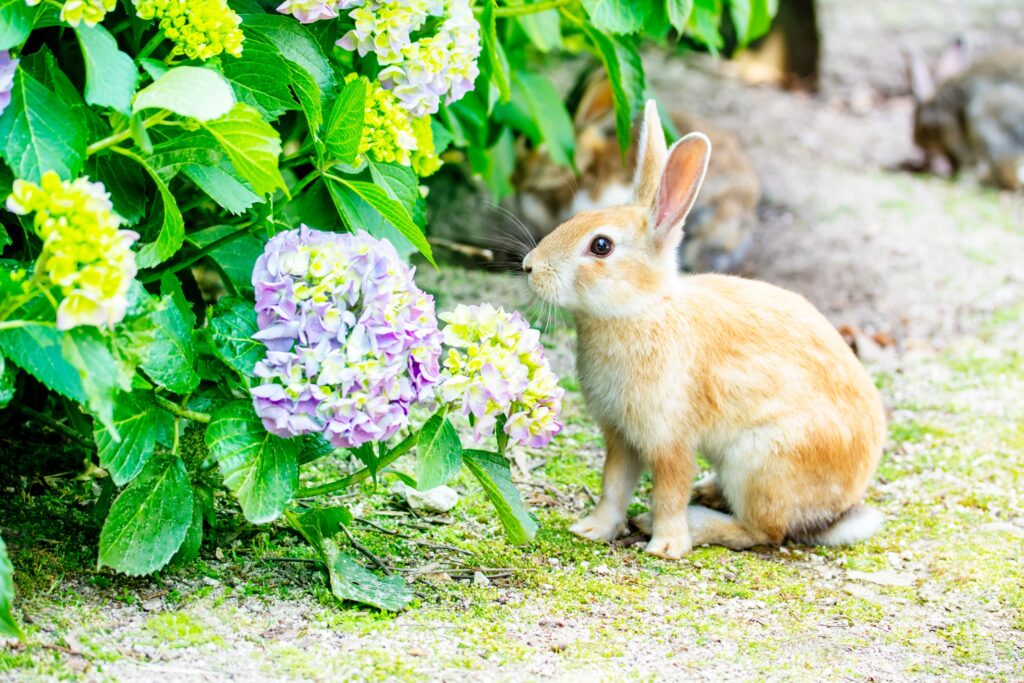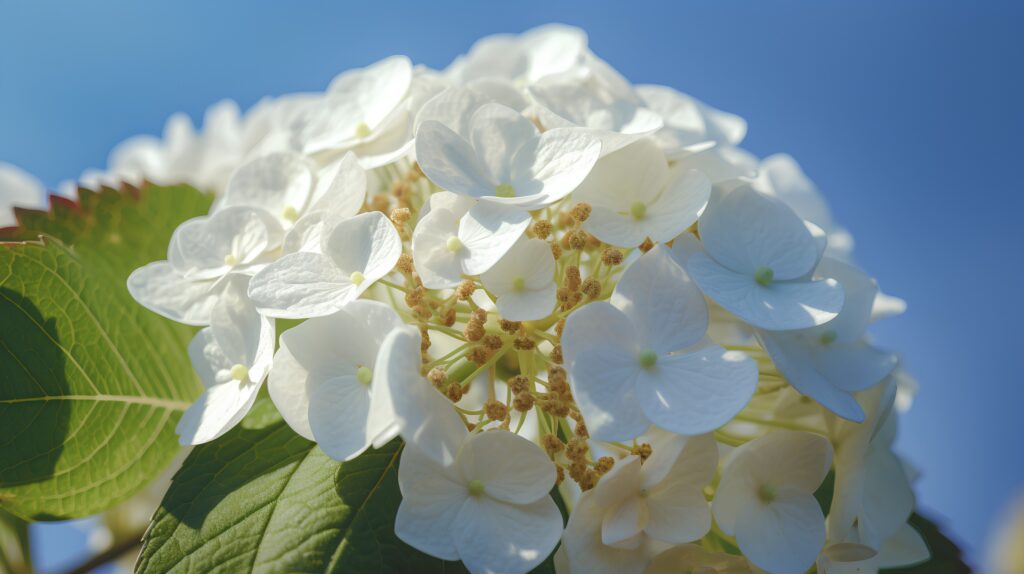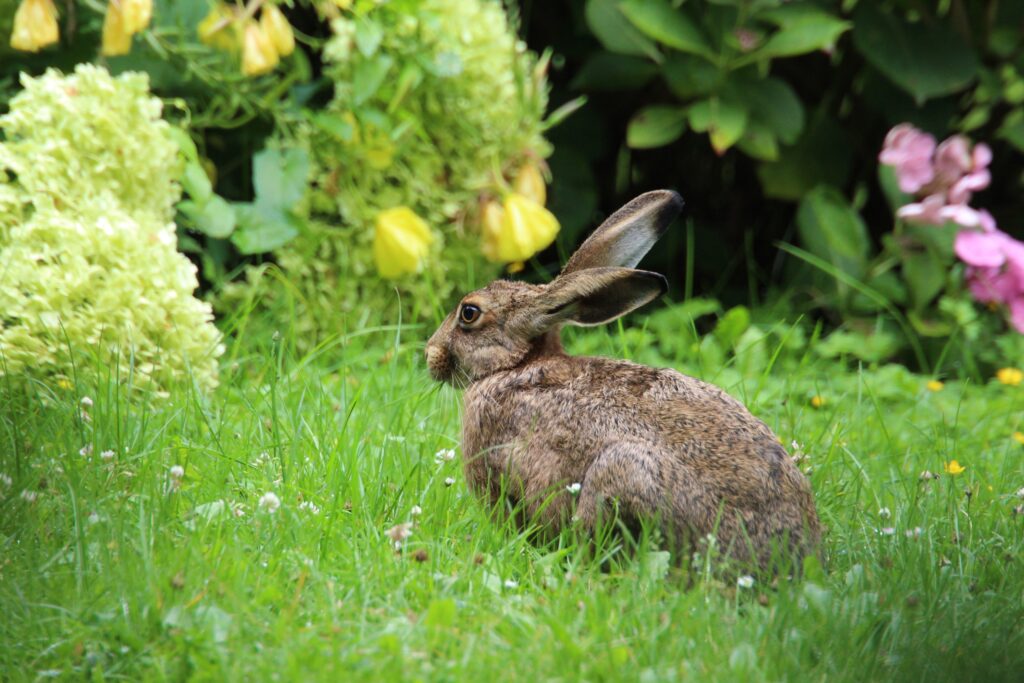Can Rabbits Safely Consume Hydrangea?
Rabbits are known for their love of greens and vegetables, but can they eat hydrangeas? This question has been asked by many rabbit owners and gardeners alike. Unfortunately, the answer is not a straightforward one.

Rabbits should not eat hydrangea plants, and hydrangea plants contain glycosides such as hydrangenin, which can harm rabbits.
When ingested, these chemical compounds may cause symptoms like vomiting, diarrhea, and an upset stomach. In more severe cases, they can even lead to respiratory problems, seizures, or kidney damage. To keep your rabbit safe, preventing them from consuming hydrangea plants and providing them with a diet of hay, fresh vegetables, and water is essential.
What parts of hydrangeas are safe for rabbits to eat?
Leaves
Unfortunately, none of the parts of hydrangea plants are safe for rabbits to eat. The hydrangeas leaves contain cyanide, which can be toxic to rabbits if ingested in large quantities. Cyanide is a poison that can cause respiratory failure, seizures, and even death. Therefore, keeping rabbits away from hydrangea plants is best to avoid potential health risks.
Flowers
Rabbits should not eat hydrangea flowers, either. Instead, the flowers contain cyanide and other toxic chemicals that can harm rabbits. Ingesting even a small amount of hydrangea flowers can cause digestive problems, such as vomiting and diarrhea, and may lead to more serious health issues.
In summary, hydrangea plants are not safe for rabbits to eat. Instead, the leaves and flowers of these plants contain toxic chemicals that can harm rabbits if ingested. Therefore, keeping rabbits away from hydrangea and other toxic plants is best to avoid potential health risks.
What parts of hydrangeas are toxic to rabbits?

Stems
The stems of hydrangeas contain cyanogenic glycosides, which can release cyanide when chewed or digested. This can lead to respiratory failure and death in rabbits.
Buds
The buds of hydrangeas contain high levels of cyanogenic glycosides, which can be toxic to rabbits if ingested in large quantities. Symptoms of bud ingestion can include vomiting, diarrhea, and lethargy.
Petals
The petals of hydrangeas are also toxic to rabbits. They contain cyanogenic glycosides, which can lead to cyanide poisoning if ingested in large quantities. Symptoms of petal ingestion can include respiratory failure, seizures, and death.
Roots
The roots of hydrangeas contain the highest levels of cyanogenic glycosides, which can be fatal to rabbits if ingested. Symptoms of root ingestion can include vomiting, diarrhea, and lethargy.
It is important to note that all parts of the hydrangea plant are toxic to rabbits, and even small amounts can cause harm. For example, if you suspect your rabbit has ingested any part of a hydrangea plant, seek veterinary attention immediately.
What are the symptoms of hydrangea poisoning in rabbits?
Hydrangea is toxic to rabbits and can cause serious health issues if ingested. Here are some symptoms of hydrangea poisoning in rabbits:
- Seizures
- Loss of body temperature regulation – high or low
- Lethargy and listlessness
- Loss of appetite
- Depression
- Digestive signs of intestinal inflammation
- Trembling and paralysis
These symptoms can be caused by the cyanogenic glycoside present in hydrangea, which can produce cyanide intoxication. Rabbits that graze outdoors are more susceptible to hydrangea poisoning as they may come across the plant while foraging for food.
If a rabbit shows any of these symptoms, it is important to seek veterinary care immediately. The veterinarian may perform a physical examination and run diagnostic tests to determine the extent of the poisoning. Treatment may involve inducing vomiting to remove any remaining hydrangea from the digestive system, administering activated charcoal to absorb toxins in the digestive tract, and providing supportive care to manage the symptoms.
Prevention is key when it comes to hydrangea poisoning in rabbits. Owners should ensure that their rabbits do not have access to hydrangea plants and remove any plants from their garden if they have a rabbit that grazes outdoors. Providing a varied and balanced diet for rabbits can also help prevent them from eating potentially toxic plants out of hunger.
What should you do if your rabbit ingests hydrangea?

If you suspect your rabbit has ingested hydrangea, it is important to take action immediately. Hydrangeas contain cyanogenic glycosides, which can be toxic to rabbits if ingested in large quantities. Symptoms of hydrangea poisoning in rabbits include vomiting, diarrhea, lethargy, and difficulty breathing.
If you notice any of these symptoms in your rabbit, it is important to contact your veterinarian right away. Your veterinarian may recommend bringing your rabbit in for an examination to determine the severity of the poisoning and to provide appropriate treatment.
While waiting for veterinary care, you can do a few things to help your rabbit. First, remove any remaining hydrangea plants or flowers from your rabbit’s environment to prevent further ingestion. You can also offer your rabbit fresh water to help flush toxins from their system.
If your rabbit is experiencing severe symptoms, your veterinarian may recommend hospitalization to provide supportive care such as intravenous fluids and oxygen therapy. Medication may sometimes be prescribed to treat specific symptoms such as vomiting or diarrhea.
Prevention is the best way to avoid hydrangea poisoning in rabbits. Keep hydrangea plants out of your rabbit’s reach and provide plenty of safe, rabbit-friendly plants and vegetables for them to enjoy.